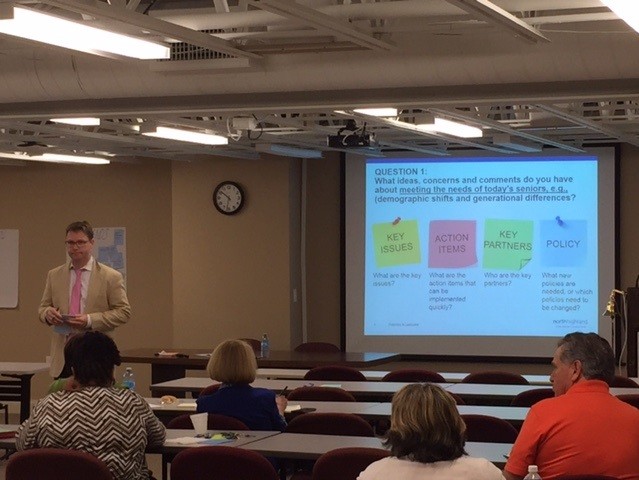Regional senior hunger was the topic of a state-funded "listening session" held Wednesday morning at Oakwood's Legacy Link, the Area Agency on Aging.
Sponsored by the Georgia Department of Human Services' Division of Aging, in conjunction with the Governor's Office, the session was the last of 12 held throughout the state to gather regional input that will then be used to develop a comprehensive state plan on senior hunger and related issues.
According to figures provided at the session, Georgia is the 9th-worst state in the country in regards to the percentage of seniors experiencing some degree of hunger-related issues. Additionally, state figures show that roughly 33% of Georgians live at or below the poverty line. with seniors making up 66% of that total.
In attendance were nearly two-dozen individuals who gathered to offer their input, with attendees ranging from officials with the Georgia Mountain Food Bank and Wisdom Keepers Council, to local nursing home employees and area citizens.
Attendees came from across the area, with representatives from Hall, Gwinnett, Forsyth and Oglethorpe counties.
Consulting firm North Highland was contracted by the state to conduct the sessions, with management consultant Terry Andrews noting that Georgia was the first state in the country to fund an initiative of this nature.
"We're inviting civic leaders, we're inviting senior homes, we're inviting transportation providers and other organizations," he said. "And we're asking very specific questions, and we're collecting the information form 12 regions across Georgia."
State officials have begun seeking out opinions and potential solutions on senior hunger-related issues, according to Andrews, because of the influx of elderly individuals coming into Georgia over the past few years.
Legacy Link Marketing Director Don Colombero echoed that sentiment, saying the state's efforts are partially grounded in a desire to learn more about the financial impact of seniors moving into the area. He said North Georgia is getting hit extra hard.
"Recent demographics show a big influx of seniors into our area compared to the rest of the state of Georgia," Colombero said.
"So last September there was a meeting held in Stone Mountain that was an opportunity to bring leaders from various organizations together to kick off this initiative that was brought forth," he explained.
Utilizing input and suggestions gathered during the sessions, Andrews said the third phase of the project will see potential solutions included in the 2017 Georgia State Plan on Senior Hunger.
The sessions involved the presentation of five questions related to senior hunger issues, which Andrews said were specifically provided by the state.
- What ideas, concerns and comments do you have about meeting the community's needs?
- What ideas, concerns and comments do you have about the health impact of senior hunger?
- What ideas, concerns and comments do you have about food access?
- What ideas, concerns and comments do you have about meeting the needs of today's seniors?
- What ideas, concerns and comments do you have around food waste and reclamation?
Andrews described the sessions as a "reverse town hall," where attendees were expected to do most of the talking.
Among the hunger-related concerns voiced by those in attendance, poverty and transportation issues were seen as the biggest factors in contributing to senior hunger, while some mentioned a lack of affordable, if not healthy, food options.
In generating ideas to combat senior hunger, some of which may be used in the state's forthcoming hunger plan, many attendees recommended prioritizing food and health education as a way of circumventing a potential lack of funding in some areas. Others suggested programs that would pair locals in need with area businesses or farmers that could provide food, and related programs aimed at reducing food waste, thereby increasing the amount of surplus food that could be donated.
"The local Publix supermarket partnered with Action Ministries to provide day-old bread, pastries, that sort of thing," one man noted. "And I know of 7 or 8 years they've been doing that."
One attendee suggested the state utilize existing programs or facilities in order to assist area seniors at a minimal addition of expense.
"Maybe there is a way to look at that," one attendee added. "Another, almost ubiquitous, service, and this may sound strange, is the Postal Service."
"They deliver mail, probably, to 90% of homes," he continued. "Maybe there might be a way of uniting food delivery and the post office."
Prior to the final stop in Oakwood, Andrews said the listening sessions visited a range of rural and urban areas across the state, mentioning previous stops in Atlanta, Rome, Tifton, Albany and Vidalia.


http://accesswdun.com/article/2017/4/529269/state-uses-listening-sessions-in-oakwood-other-towns-to-generate-plan-on-combating-senior-hunger
